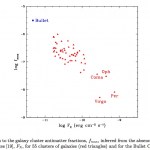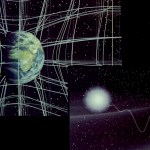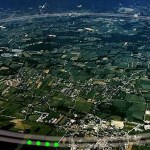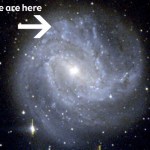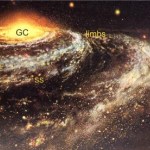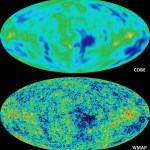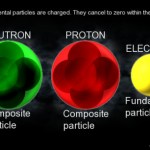matter
“If you see an antimatter version of yourself running towards you, think twice before embracing.” -J. Richard Gott III
It may not occur to you that it's a special thing that the Earth and everything found on it is made of matter; it seems intuitive that it couldn't be any other way. And yet, the very laws of nature themselves haven't yet told us why or how the Universe is this way! For this week's Ask Ethan (and leave your own questions or suggestions here), our regular reader Michael Fisher wants us to get at the heart of this, asking:
Is it true that in the early universe matter…
"The mind, once expanded to the dimensions of larger ideas, never returns to its original size." -Oliver Wendell Holmes
When General Relativity supplanted Newton's work as our theory of how gravity works in the Universe, it didn't just change how we view how masses attract, it gave us a new understanding of what the questions where and when actually mean. It gave us the very fabric of spacetime.
Image credit: Christopher Vitale of http://networkologies.wordpress.com/.
What this meant is that no longer could we view objects like matter and radiation as existing in some fixed, grid…
"Great spirits have always encountered violent opposition from mediocre minds." -Albert Einstein
It may be hard to believe, seeing as how it's been our leading theory of gravity for nearly a century now, but Einstein's General Relativity is possibly the most frequently challenged scientific idea of all-time. Of course, it's emerged victorious from each and every one of those challenges, making a slew of unintuitive predictions that have been spectacularly confirmed each time they've been tested.
Image credit: Miloslav Druckmuller (Brno U. of Tech.), Peter Aniol, and Vojtech Rusin.
This…
"Other than the laws of physics, rules have never really worked out for me." -Craig Ferguson
Earlier this week, evidence was presented measuring a very rare decay rate -- albeit not incredibly precisely -- which point towards the Standard Model being it as far as new particles accessible to colliders (such as the LHC) go. In other words, unless we get hit by a big physics surprise, the LHC will become renowned for having found the Higgs Boson and nothing else, meaning that there's no window into what lies beyond the Standard Model via traditional experimental particle physics.
Image credit:…
One of the fundamental aspects of physics is the study of light and how that interacts with matter. I have been putting off this post - mainly because I am not a quantum mechanic (I am a classical mechanic). There are lots of things that could be done in this post, but I am going to try and keep it limited (and maybe come back to the interesting points later). Also, most of my posts are aimed at the intro-college level or advanced high school level. This will be a little higher. If you are in high school, there is still a lot of stuff for you here.
Let me summarize where I am going to…
There is a very techincal paper this morning by Martin Bojowald that asks the question, How Quantum Is The Big Bang? Let me break it down for you.
If you took a look at empty space and zoomed in on it, looking at spaces so small that they made a proton look like a basketball, you'd find that space wasn't so empty after all, but was filled with stuff like this:
What are these? They're little pairs of matter particles and anti-matter particles. They spontaneously get created, live for a brief fraction of a second, and then run into each other and disappear. That's what happens on very small…
(This is adapted from my public lecture, Afraid of the Dark: How We Know What We Can't See.)
Let's go back over 200 years ago, to 1781. William Herschel (left) discovered the planet Uranus, noticing that an object, as bright as a star, was actually moving relative to the other stars. The other five inner planets (besides Earth) were known for over 2000 years before that. But it was thought for a long time that Saturn was the farthest one.
But it clearly isn't; as you can see with modern telescopes, Uranus is a super-interesting planet, rotating on its side, surrounded by rings and moons.…
Hector writes in and asks about someone from Sheffield in the UK who says that the Large Hadron Collider (LHC) will create Dark Matter:
The massive ATLAS detector will measure the debris from collisions occurring in the Large Hadron Collider (LHC) which recreates the conditions found in the early universe during the Big Bang when Dark Matter was first created. If the LHC does indeed create such particles then it will be the first time that the amount of Dark Matter in the universe has increased since the Big Bang - the LHC will effectively be a Dark Matter 'factory'.
Well, Hector basically…
Can you believe that I had a fight today with someone who's been dead for over 350 years, and I'm losing? -- Ethan, yesterday
Of course you can believe it, when the man I'm fighting with is Johannes Kepler. I don't get a chance to tell you about my research very often, mostly because it's still a work in progress. But my latest paper was just submitted and is now out of the way, and so I'd like to tell you what I'm working on at the moment.
Well, there we are in the galaxy. We look up at the night sky, and we see our planets as well as all the stars that surround us. But you know what we don…
Remember how I told you earlier this week that DAMA was going to announce that they found dark matter, even though the signal that they found is not consistent with other experiments?
Looks like my powers of predicting the future are pretty damned good. They have a new plot with more data showing the continued modulation at a certain energy range:
and also one showing the fact that they see a bunch of extra events happening in that energy range:
So here's the stuff that DAMA has seen: a nuclear recoil that has many events in a certain energy range, and has a 2% annual modulation in that…
Yesterday, my good friend (and SWAB reader) Brian wrote a great comment about the practical reasons to explore space, where he talked about the overall economic impact that Space Exploration has had on the economy, as well as the impact it has had on our knowledge and understanding of the Earth, its environment, and how to manage/mitigate the threats to it. And that's wonderful for exploring our Solar System and others.
But what do I do in the meantime? After all, this isn't what I study or explore. So I asked this:
The practical arguments as to why exploration of space is worthwhile…
The DAMA collaboration, an experimental team searching for dark matter via direct detection, is poised to report this week that they have discovered Dark Matter. And I'm here to pre-empt that by bringing you the truth: no, they haven't.
They take some very cold (cryogenic) atoms,
look for nuclear recoils resulting from dark matter collisions, subtract the background, and draw conclusions based on whatever's left over. Their expectations are based on the following:
Neutrons, neutrinos, and other standard model particles from the Earth, the Sun, and the Milky Way galaxy will collide with the…
So last week I was up at Pacific University in Portland, OR for a job interview. As part of a faculty interview, you have to lecture on a topic for undergraduates, but they give you the topic just a couple of days before. My topic was Gauss' Law, which talks about the relationship between an Electric Field and an Electric Charge. Well, the same law holds for Newton's theory of Gravitation with a gravitational field instead of an electric field and a gravitational charge (i.e., mass) instead of an electric charge.
So I'm at work today thinking about this, doing the thing I do messing around…
So I gave a public lecture last (Monday) night called, "Afraid of the Dark: How We Know What We Can't See" and videotaped it. Now, I'm pretty good at what I'm doing right now (research in theoretical cosmology), but I'm really good at public speaking and teaching, and here is me telling a public audience all about dark matter, how we know it exists, what makes it different from normal matter, and what I'm trying to do to find it/discover its nature for a good 40 minutes. (The intro and question/answers are cut out).
It was a lot of fun; the audience was wonderful, and actually kept me for…
The cosmic microwave background is the radiation left over from the big bang. It's very uniform, 2.725 Kelvin everywhere. We're moving with respect to it, so there's a doppler shift, and we see that as a dipole moment in the Temperature. When we subtract that out, we see variations on the order of 30 microKelvins! WMAP is a satellite (Wilkinson Microwave Anisotropy Probe) that measured these anisotropies, and they just released its year 5 data. First off, with the uniform and dipole parts subtracted out, and with the foreground from the galaxy also taken out, here's the map of the microwave…
I love The Straight Dope. For 35 years, people have written in and asked some of the most difficult-to-answer questions on any topic you can think of; the staffers, writing under the pseudonym Cecil Adams, do their best to get to the bottom of their questions. Well, they also have a message board, and I saw one of the most difficult questions I've ever seen there:
Where does all the matter in the universe come from?
I'm no[t an] astrophysicist but I understand a little about the Big Bang Theory and also that there's lots of stuff we don't know or probably ever will know about it.
But the…
Last week, Pamela Gay over at Star Stryder pointed me to a press release which claimed that, among other things, perhaps dark matter wasn't necessary. So I wrote a guest post on her blog explaining why it was. Apparently, some people still aren't convinced. So I will lay out for you all the reasons I can think of why we need it, and explain what happens if you try to do without it.
1. Cluster Velocity Dispersions. When we take a look at galaxies, we often find hundreds or even thousands of them clustered together, like in the Coma Cluster. We can measure how quickly those galaxies are moving…
